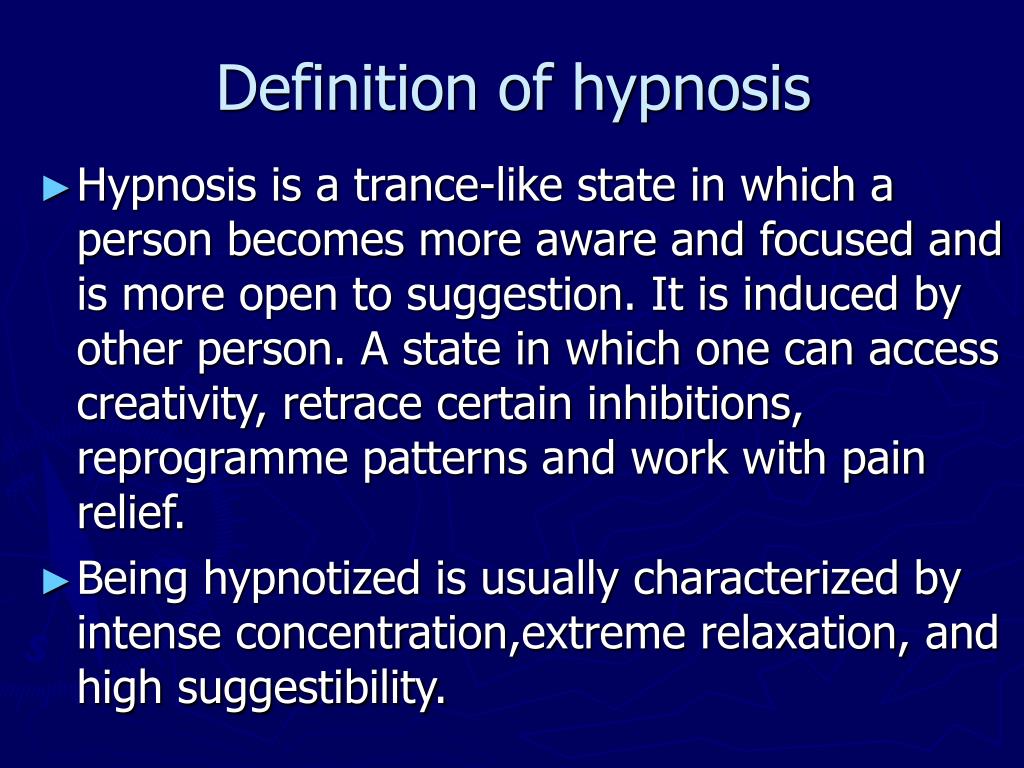

Breuer discovered he could address patients directly whilst they were in hypnosis which led to the basis of modern day hypnoanalysis and psychoanalysis. In 1895 Freud co-authored his famous book “Studien uber Hysterie” with Joseph Breuer, master hypnotist. Since he had a belief in the use of hypnosis, it also became accepted by many doctors.ĭoctor Sigmund Freud 1856-1939 initially used hypnosis to release the emotions of patients whilst they were in a trance state. Charcot was widely recognised throughout the medical world for his expertise in neurology. This was the first recorded attempt at scientific classification. Bernheim published his book ‘De La Suggestion’ that proposed suggestion as a cure for the mind and body.ĭr Jean-Martin Charcot’s 1825–1893 principal contribution to the history of hypnosis was in identifying and labelling varying depths of trance. They stated that hypnosis was not caused by any mechanical means but by suggestion. They were French doctors who helped to demystify hypnosis and create an understanding of it as a normal state. He was accused of being a charlatan and eventually was discredited and demoralised.ĭoctors Hippolyte Bernheim and Auguste Ambrose Liebault formed the Nancy school of hypnosis 1837–1919. He put this down to lack of belief and negative expectation. When Esdaile returned to England he was unable to repeat the successes he achieved in India. His work was widely accepted and even revered in India whilst the British Medical Association stated that it was probably so successful in India because it was likely to be accepted by the masses there, and would be unlikely to work in England. Also, the mortality rate during operations dropped from the normal rate at that time of 25-50% down to 5%. He used it in over 3000 operations and noted it produced insensitivity to pain.

Despite’s Elliotson’s low mortality rate and high success rate, his fellow doctors believed that pain was necessary for healing, and eventually the medical profession closed ranks and virtually forced him out of hospital practice.Ī Scottish doctor Dr James Esdaile (1808-1859) used hypnosis whilst chief surgeon of a hospital in Calcutta, India. This was much to the wrath of his fellow doctors. He published his findings in Neurypnology (1843), arguably the first book on ‘hypnosis’ĭr John Elliotson (1791-1868), a London physician performed over one thousand painless operations using hypnosis. Having realised this, he later tried to change the term hypnosis, but unfortunately the term stuck and its use persisted. This is an unfortunate term, as hypnosis is not the same as sleep. He coined the term hypnosis based on the Greek ‘hypnos’ meaning sleep. He categorically rejected any supernatural explanations of trance and grounded the study of hypnosis on a firm empirical and scientific basis. Having watched a stage performance of magnetism, he came to the conclusion that it was entirely a hoax. The modern scientific understanding of hypnosis originates with the pioneering work of a Scottish doctor named Dr James Braid (1795-1860). This incorrect idea is probably partly responsible for the fear and misunderstanding which surrounds hypnosis to this day. Both Mesmer and later De Peysegur’s work implied that the magnetiser or hypnotist had some power which, he could call at will, to effect a cure. Notable physicians and religious authorities denounced Mesmer as a fraud. Mesmer chanted and used an eye fixation method to induce a hypnotic trance. He claimed that magnets could restore the balance of magnetic fluid and thus cure the sick. Mesmer believed that an invisible magnetic fluid was to be found throughout nature and within every human body. Instead they have jealously guarded their ‘special gift’ and often linked it with religion and thus instilled an aura of supernatural power in themselves.įranz Anton Mesmer 1734 – 1815 was one of the first to offer an explanation of what he was doing other than claiming some mystical powers. Unfortunately, the pioneers of hypnosis have done little to de-mystify it. Hypnosis has also been used by Hindu Fakirs, native medicine men, witch doctors, and shamans. Ancient Greeks were known to have used hypnosis for surgical preparation as well as for hypno-healing.

For example, hieroglyphics found on Egyptian tombs, believed to be from 3000bc, depict the use of hypnosis in religious rites and surgical procedures. It most likely stretches back into ancient history. The use of hypnosis, in its general sense, is found in virtually every culture across the world.


 0 kommentar(er)
0 kommentar(er)
